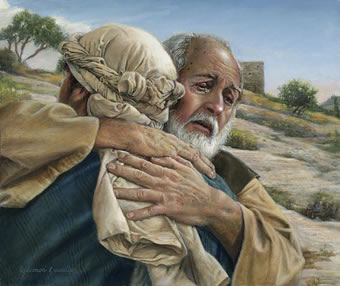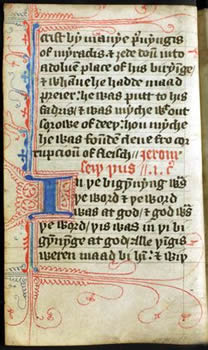Turn, Turn, Turn
A guest essay by Lindsey Crittenden, author of The Water Will Hold You: A Skeptic Learns to Pray (Harmony, 2007) and The View from Below: Stories. She blogs regularly for Good Letters: The Image Blog. She lives in San Francisco and teaches at UC Berkeley Extension. For more information, see www.lindseycrittenden.com.
For Sunday March 14, 2010
Fourth Sunday in Lent
Lectionary Readings (Revised Common Lectionary, Year C)
Joshua 5:9–12
Psalm 32
2 Corinthians 5:16–21
Luke 15:1–3, 11b–32
I’ve always identified with the prodigal son’s elder brother. He got a bad rap — the outsider in the family triangle, the dull responsible one next to the gimme-gimme attention-getting squanderer. I’ve secretly cheered on the elder brother’s anger at coming home from another day of dutiful work in the field to hear music and dancing. And I’ve felt — I’ve known — his surge of righteous indignation.
As a girl, I watched my brother get away time and time again with mischief, trouble-making, disobedience. I heard my parents explain to him why it was wrong to throw water balloons at cars or vandalize my dollhouse or steal coins from my father’s top drawer. I listened to him say, “I won’t do it again,” and I heard them say, “Okay, then.”
Of course he did it again — perhaps not the exact same behavior, but the next step in what felt like an inevitable downward spiral. Crashing my parents’ car; coming home drunk; cutting class; smoking pot. By nineteen, my brother was a full-fledged drug addict, insisting to me that smoking crack “was no big deal.” It was 1986 and, he insisted, the crack epidemic largely a CIA plot to keep down inner-city blacks. “I can quit anytime,” he told me over beer and burgers one night at the Old Town Saloon in New York City. “Don’t worry, hon; I can handle it.”
 |
He couldn’t, of course. He hit bottom once, twice, three times — each hit bottoming further and further. He went in and out of drug rehab. In the early hours of January 8, 1994, he drove away without paying for a vial of crack and was shot in the head. He died later that day, at 3:08 p.m.
During my brother’s decline, my parents played the role of what the self-help literature and Twelve-Step programs call “classic enablers.” They continued to give him money and co-sign leases and bail him out of jail. While I got my first salaried job and paid my rent and deposited my paltry $20 of savings from each paycheck and lived on Chinese food and brown-bag lunches, my brother zigzagged from apartment to apartment, job to job (none of which involved a W-2), girlfriend to girlfriend. He was all drama and excitement; I was all drudge and responsibility.
Prodigal, according to the Oxford English Dictionary, means “given to extravagant expenditure; recklessly wasteful of one’s property or means.” The OED cites the first usage to the early sixteenth century. But Jesus, of course, spoke in Aramaic, and the gospel of Luke was written in Greek. While the phrase “prodigal son” has become a shorthand for the parable told in Luke 15:11–32, the word “prodigal” does not appear in the New Revised Standard Version or the King James Version or even the earliest English translation, the Wycliffe Bible of the late 14th century. NRSV says the younger son “squandered his property in dissolute living”; the KJV uses “riotous” as the key adjective; Wycliffe tells us that “he wastide hise goodis in lyuynge lecherously.”
For “dissolute/riotous/lecherous,” the Greek original would have been asotos, which comes from the Greek verb sozo, “to save.” Put that nullifying Greek “a” at the front and you get “unsaveable.” This lends a whole new meaning. It’s not just that the wasteful son squandered his inheritance and engaged in wasteful living — but that he did so as if beyond the need for salvation. As my brother told me, “I can handle it, hon.”
 |
For years, my identification with the older son in Jesus’ parable troubled me. The story so obviously comes out on the side of God’s forgiveness and rejoicing over the return of the prodigal; the elder brother seems the spoiler, the whiner, the foil to the father’s final words: “we had to celebrate and rejoice, because this brother of yours was dead and has come to life, he was lost and has been found.”
What kind of petty older sister was I to keep a tally under such circumstances?
There’s a key difference, of course. The prodigal son admits his error, and does so sincerely. He determines to “get up and go out to my father, and … say to him, ‘Father, I have sinned against heaven and before you; I am no longer worthy to be called your son; treat me like one of your hired hands’” (vv 18–20). The father has not yet heard the son’s apology — but he doesn’t need to. The son has made the change, admitted the need. And the father sees him from afar and runs to greet him, in a description that has always reminded me of Melanie spotting Ashley’s return to Tara. My brother finally admitted his powerlessness in the face of drugs, but for most of the squandering and bailing out, he and my parents colluded in a kind of sick and tragic game.
The lesson of the parable doesn’t need the elder brother. Jesus has already told about the lost sheep and the lost coin, and just to make sure that the tax collectors, sinners, Pharisees, and scribes get the message, he ups the ante to the lost son. He didn’t need to include verses 25 to 31; the story would still carry weight without the elder brother’s resentment. So why include it? Why have the elder brother at all?
Here’s an idea: God sees all sides, God understands how the elder brother would feel. Yes, the elder brother misses the point but he too is the father’s son. When the father speaks his reassurance — “Son, you are always with me, and all that is mine is yours” — Jesus makes two points. Anger is a human, understandable reaction — but it’s not the end of the story. The elder brother may not have been given a young goat, but he’s had his father’s constancy all along. His transformation isn’t as dramatic or marked as his younger brother’s, but that doesn’t mean it hasn’t occurred.
Being the dutiful child is a burden. In some ways, the role of the prodigal is easier in its spectacular crash and burn. To slog away out of duty and purpose doesn’t make for high drama. And yet, to wake up from mere duty and realize, one day, that you’ve had love all along — that, too, can turn lives around.
 |
Crazy Heart. |
A few weeks ago, I went to see Crazy Heart, the movie for which Jeff Bridges might get an Oscar this coming Sunday night for his portrayal of Bad Blake, the washed-up country musician who finds love, loses love, hits bottom, and gets redemption. This being a Hollywood movie, when he decides to get sober, four months at an upscale facility does the trick. He sits in a circle under the cottonwood trees with other men and admits his alcoholism. The next scene shows Robert Duvall coming to pick him up from rehab, and Bad’s announcement that he’s all better.
Uh-oh, I thought. Here we go. I spent the rest of the movie waiting for the relapse, but it never came. And therein the movie lost me. Much as movies about writers show an actor frowning in attractive concentration over an ink-blotted page or an old Royal typewriter or a sleek laptop, music swelling and inspiration streaming in the window or flickering from lamplight, and then, voilà, the completed work, movies simplify rehab. After all, DTs and relapses slow down the narrative arc.
Like Bad Blake, the prodigal son hits bottom once and sees the errors of his ways. He finds himself reduced to feeding swine, the lowest of the low in job hierarchy in his world. The shift comes when he “came to himself” (verse 17), indicating an aha moment, a turn, a realization — metanoia, in Greek, which means “repentance.” Aristotle used the term in his Poetics to refer to a rhetoric device of correction, a plot point that turns around the narrative. According to Wikipedia, the word is also used in psychology to refer to the process of “experiencing a psychotic breakdown and subsequent, positive psychological re-building or healing.” All of which apply to the parable, to Crazy Heart, and to the neatness of stories as opposed to real life. “Unsaveable” becomes, through metanoia, the stuff of transformation and celebration. Not to say that it can’t happen in real life but that it’s rarely so one-step, so linear.
 |
Wycliffe Bible image. |
In the weeks following my brother’s death, I heard a lot of well-meaning words of intended comfort. It’s God’s will, some said, while others told me that my brother was in a better place and no longer suffering. Neither of these comforted; in fact, they often made me want to scream. What did comfort me was what a recovering addict friend of my brother’s told me one day: “He was on a path. As long as he kept using, this is where he was going.”
At first, the words seemed harsh, their implication unpalatable. Was he suggesting my brother was unsaveable? I don’t think so, but I do think he was saying that until my brother “came to himself” — and, I’ll add, stayed there — there was nothing anyone else could do.
I’ve had to make a turn, too, away from anger and resentment. We don’t know how the elder brother responds — if he joins the party, or if he storms off in a huff — but the implication seems clear. The father’s love is big enough for both.
Image credits: (1) PictureThis!; (2) ItsABlackThing.com; (3) Fox Searchlight; and (4) The Way: Live, Love, Learn the Orthodox Faith.





